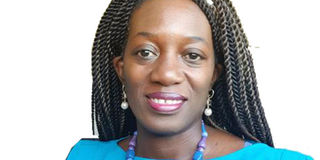Is racism the new pandemic?

Liza Sekaggya
What you need to know:
- Black women are subject to double prejudice - both gender and racial discrimination - for example, in career development and advancing in leadership positions, even when qualified and experienced.
- Systemic and institutional racism manifests itself in social, economic and political structures and spaces.
As an African woman , I had never experienced racism until I came to study at university in Europe.
After the killing of George Floyd, I was initially passive, but progressively my feelings snowballed and evolved into anger, and rage. How human beings could stand and witness his death is outrageous because the right to life is so sacred.
As a mother of two African boys, I felt a responsibility to speak, reminding my older son (19), a student in the UK, that statistically, he was susceptible to being stopped and racially profiled, and warned him to be extremely respectful and cooperative with the authorities.
In 2018, my son was awarded a partial sports scholarship at an American university. However, his father and I opted to send him to the UK instead, given recurrent reports of racial violence against Black men by police officers.
I called my son and asked for his views. He was passive and stated it was an African-American narrative and not ours. But as demonstrations of the ‘Black Lives Matter,’ movement unravelled globally, he attended a demonstration in London, and changed his perspective. “Mom, the police killing an unarmed Black man was wrong… I can’t breathe”, he said angrily in our tele-conversation.
Although I was proud of his conscientious activism, I was pre-occupied by fear. As a person of African descent, he was genetically predisposed to being racially profiled by police. No one would be able to distinguish him as an “Afro-Swiss” student with no criminal record. I subsequently provoked a discussion on human rights and safety during protests. People of all races, especially young people, have risked their health and safety to demonstrate in the wake of the Covid-19 pandemic, depicting racism as the new pandemic that has superseded the health crisis.
Ironically, some American online tools facilitated my discussion on racism with my five-year-old son, who had been innocently chanting “Black Lives Matter.” As I prayed for protection for both my sons during the two “pandemics,” I got taken back to a dark place.
“I can’t breathe ” symbolically represents structural and tolerated racism and injustice. As a black woman living in Europe, I too have been judged by my race. I once got a job offer following a telephone interview, arrived at the job, to be told it is “no longer available.” Another time, my point was rejected at a meeting until a White colleague repeated it. Although the gravity of my experiences is incomparable to the Floyd incident, they are still micro aggressions experienced by many African people abroad.
Black women are subject to double prejudice - both gender and racial discrimination - for example, in career development and advancing in leadership positions, even when qualified and experienced. Systemic and institutional racism manifests itself in social, economic and political structures and spaces.
Recently, the United Nations Deputy Secretary General, Amina Jane Mohammed , stated at the Human Rights Council debate on racism, “The colour of our skin sentences us to a life of injustice ”.
We need to be clear and vocal in addressing the root causes of this pandemic. As human beings, we all have unconscious bias within us, and the potential to discriminate others for various reasons. We need to work on this innate bias. Judge people for the “content of their character and not the colour of their skin,” as Dr King put it.
Have a conversation with children about racism and respect for human dignity in our communities.
As government , remove structural barriers that perpetuate discrimination and prevent progress. Ensure equal opportunities for all people. The UN Sustainable Development Goals give guidance on key targets.
We all must continue to fight racism and continue the legacy of Nelson Mandela and Dr Martin Luther King: “Injustice anywhere is a threat to justice everywhere”.
Ms Sekaggya is an international human rights lawyer working in Geneva, Switzerland. [email protected]




